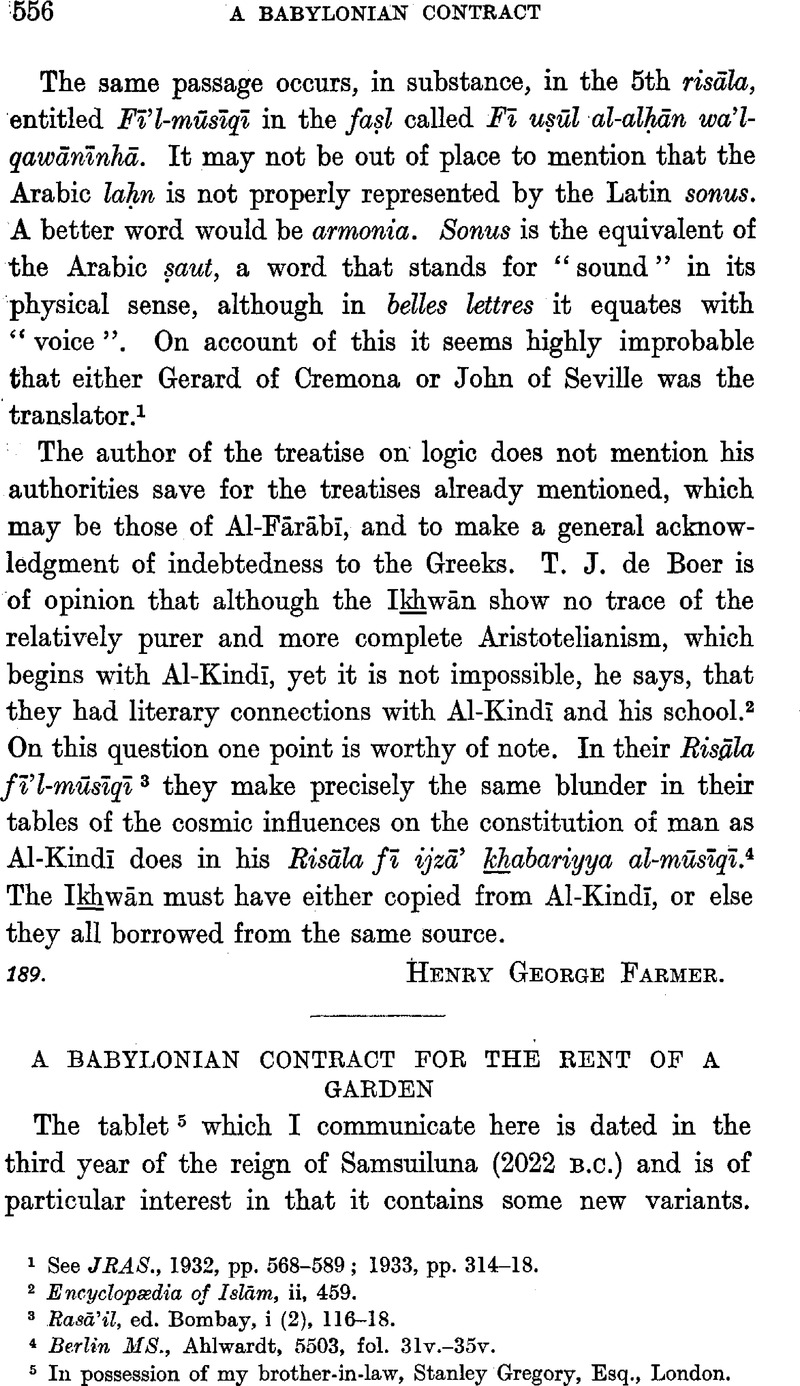Published online by Cambridge University Press: 15 March 2011

page 557 note 5 In possession of my brother-in-law, Stanley Gregory, Esq., London.
page 578 note 1 I cannot interpret thia name. On names beginning i-zi, i-ṣi, is-si, see TheoBauer, , Ostkanaanäer, 55Google Scholar.
page 578 note 2 I do not know this word. Is it a rendering of kirû absinnu? Cf. VS. vii, 100, 1.
page 578 note 3 Sic! not genitive. Cf. ištu a-ta-pu-um, CT. 8, 49 B 5; i-ta a-ta-pu-um, Schorr, , VAB. v, 16, 11Google Scholar.
page 558 note 4 Or a-ḫar, behind? If so this is new.
page 559 note 5 Ungnad, Hence, VAB. vi, 199Google Scholar, 12, Ma-du-ti is a proper name.
page 558 note 6 zinû, loan word, from giš;zi-na gišimmar = zi-nu-u, MVAG. 1913 2, 25Google Scholar, 20, in list with libbi if si, 1. 11 (same word as libbu, Schorr, 136, 5, U-ib-baam si-na-am inaṣar), defined in Sumerian as giš-āag gisimmar “heart of the date palm”, hence no connection with lîpu, offspring (lîplîpu “palm branches” does not exist). Schorr's note, ibid., p. 192, is false. libbu, Syn. zinû, sinû, is Syr. lebbā, ace. to Meissner, ibid., p. 40, “frond of the date palm” ; 1. 13, uḳuru, palm cole; then in following group with aru, našbaṭu, broken branch, comes zi-nû = zinû, with aṡitu, imbû, rikbi, certainly names of branches ; see zí-na in OECT. viii, 22, 7, and note; doors made of zí-na.
page 559 note 1 This valuable text gives the reading of the title ![]() , Thureau-Dangin, , RTC. 20, ii, 3Google Scholar, the gaeš-e purchased potash, etc., and the gaešmaǵ-e brought potash, etc., for the palace for the nam-gaeš-ag making the namgaeš of the ships of Elam, 21, ii, 5, whence Thureau-Dangin, , Nouvelles Fouilles, 221Google Scholar, commenting on Amaregal, the goeā, suggests “cleaner, laundry-man”. The amegaeš, PBS. ix, 12, Obv. 9, written
, Thureau-Dangin, , RTC. 20, ii, 3Google Scholar, the gaeš-e purchased potash, etc., and the gaešmaǵ-e brought potash, etc., for the palace for the nam-gaeš-ag making the namgaeš of the ships of Elam, 21, ii, 5, whence Thureau-Dangin, , Nouvelles Fouilles, 221Google Scholar, commenting on Amaregal, the goeā, suggests “cleaner, laundry-man”. The amegaeš, PBS. ix, 12, Obv. 9, written ![]() , with whom silver is deposited, Genouillac, , Inv. ii, 4647, 9Google Scholar, who renders “laundry-man”. The ga-(r)eša-ab-ba-ka-ge, Dél. Per., xiv, 22,9. VAT. 9714, Obv. i, 32–5, has ŠGA-RA = ga-eš-šu (= karašu, garlic, RA. 24, 82), followed by GA-RAŠ = muš-tam-ki-ru, ma-ki-su, and [sá-kud-]da = makisu. Hence (1) garaš > gaeš = Karašu, kaiššsu, gaeššu, garlic, leek ; (2) ga-ra-aš = GA-RA§ = puntssû (Syl. B', ii, 4), decision, and mākisu, tax-gatherer? Or is muštamkirv, from makāru “to wet, sprinkle”, hence “laundry-man”, and mākisu also “laundry-man”? makāru, to exchange, buy and sell, kaspa uštammakaru, Pohl, , MAG. v 2, 62, 17Google Scholar. Hence muštamkiru “merchant”?
, with whom silver is deposited, Genouillac, , Inv. ii, 4647, 9Google Scholar, who renders “laundry-man”. The ga-(r)eša-ab-ba-ka-ge, Dél. Per., xiv, 22,9. VAT. 9714, Obv. i, 32–5, has ŠGA-RA = ga-eš-šu (= karašu, garlic, RA. 24, 82), followed by GA-RAŠ = muš-tam-ki-ru, ma-ki-su, and [sá-kud-]da = makisu. Hence (1) garaš > gaeš = Karašu, kaiššsu, gaeššu, garlic, leek ; (2) ga-ra-aš = GA-RA§ = puntssû (Syl. B', ii, 4), decision, and mākisu, tax-gatherer? Or is muštamkirv, from makāru “to wet, sprinkle”, hence “laundry-man”, and mākisu also “laundry-man”? makāru, to exchange, buy and sell, kaspa uštammakaru, Pohl, , MAG. v 2, 62, 17Google Scholar. Hence muštamkiru “merchant”?